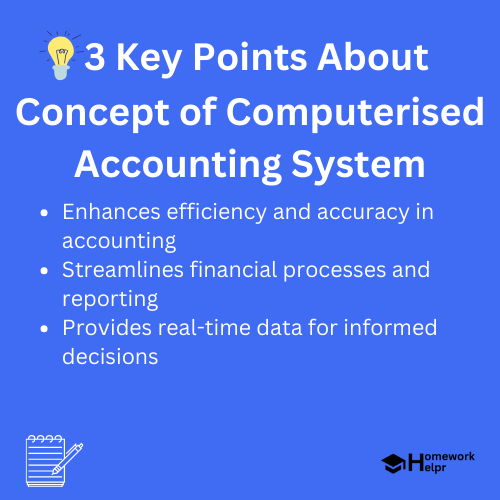📝 Summary
A Computerised Accounting System (CAS) is a software solution that automates and manages financial transactions, significantly boosting the efficiency and accuracy of accounting processes for businesses. This digital approach simplifies essential functions like data entry, posting to ledgers, and report generation. Key benefits include time efficiency, reduced error rates, and enhanced data security. Despite some challenges during implementation, such as initial costs and resistance to change, the long-term advantages of using a CAS greatly outweigh the initial hurdles, making it crucial for modern businesses.
Concept of Computerised Accounting System
A Computerised Accounting System, often referred to as a CAS, is a software solution designed to manage and automate financial transactions and record-keeping for businesses. This system utilizes technology to enhance the efficiency and accuracy of the accounting processes, providing an easier way for companies to handle their finances. In this article, we will explore the definition, features, advantages, and importance of computerised accounting systems.
What is a Computerised Accounting System?
A Computerised Accounting System is an electronic platform that simplifies the process of accounting. It comprises software that performs essential accounting functions like recording transactions, preparing financial statements, generating reports, and managing budgets. By replacing traditional manual accounting methods, a CAS allows businesses to streamline their operations and minimize the chance of errors.
The typical functions of a Computerised Accounting System include:
- Data Entry: Recording all financial transactions accurately and in real-time.
- Posting to Ledger: Automatically posting entries to the correct accounts and ledgers.
- Report Generation: Creating income statements, balance sheets, and cash flow statements.
- Inventory Management: Keeping track of stock levels and inventory costs.
Definition
– Financial Transactions: Any monetary exchange that occurs during business activities. – Ledger: A book or digital record that contains all financial transactions of a business.
Features of a Computerised Accounting System
There are several essential features associated with a Computerised Accounting System that contribute to its effectiveness. Below are some of the key features:
- User-Friendly Interface: Designed to be intuitive, allowing users to navigate easily without extensive training.
- Automation: Automating repetitive tasks reduces manual workload and minimizes errors.
- Integration: Ability to integrate with other software such as inventory management and payroll systems.
- Cloud Capability: Many modern CAS solutions offer cloud storage, enabling access to data from anywhere and facilitating real-time reporting.

Advantages of a Computerised Accounting System
Implementing a Computerised Accounting System offers numerous advantages for businesses. Some of the most notable include:
- Time Efficiency: CAS significantly speeds up the accounting process, allowing businesses to process transactions quickly.
- Accuracy: Reduces human error through automation, leading to more reliable financial reports.
- Cost-Effective: Although there is an initial investment, it ultimately leads to cost savings thanks to reduced labor hours and fewer errors.
- Data Security: Protects sensitive financial information with advanced security measures and backup options.
Definition
– Automation: The use of technology to perform tasks without human intervention. – Integration: The combination of different systems or software to operate seamlessly.
Importance of Computerised Accounting Systems
The importance of a Computerised Accounting System cannot be overstated. Here are several reasons why it is crucial for businesses:
- Real-Time Data: Provides immediate access to up-to-date financial information, helping in making informed decisions.
- Regulatory Compliance: Helps businesses adhere to regulations by maintaining accurate records and making audits simpler.
- Scalability: Can easily grow with a business, accommodating increased transaction volume or additional users.
- Enhanced Reporting: Generates detailed reports that help analyze trends and financial performance.
Examples
For instance, a retail store can utilize a CAS to keep track of sales, expenses, and inventory levels all in one system. This allows them to quickly respond to changes in consumer behavior and inventory needs.
How to Choose the Right Computerised Accounting System
Choosing the right Computerised Accounting System for your business involves considering several factors. Here are some tips to guide your selection:
- Business Size: Evaluate if the system can cater to your business size and requirements.
- Budget: Determine your budget for software procurement and recurring fees.
- Features: Ensure the system includes necessary features such as reporting, inventory management, and invoicing.
- Customer Support: Look for a vendor that provides excellent support and training.
❓Did You Know?
The first computerized accounting system was developed over 60 years ago, showcasing how rapidly technology has advanced!
Challenges of Implementing a Computerised Accounting System
Despite the numerous benefits, businesses may face certain challenges when transitioning to a Computerised Accounting System. Some common challenges include:
- Initial Cost: The setup and training may require a significant financial investment.
- Data Migration: Transitioning historical data from manual to digital can be complex and error-prone.
- Resistance to Change: Employees may resist adopting new technologies and methodologies, impacting implementation.
- Technical Issues: Like any software, CAS can encounter bugs or system failures that require prompt support.
Definition
– Data Migration: The process of transferring data between storage types or formats. – Resistance to Change: A common phenomenon where individuals are hesitant to adopt new methods or technologies.
Conclusion
In conclusion, a Computerised Accounting System represents a transformative approach to handling financial management for businesses. It enhances accuracy, efficiency, data security, and compliance with regulations, offering various advantages for organizations of all sizes. While challenges may arise during its implementation, the long-term benefits often outweigh the initial hurdles. By carefully selecting the right system and training staff adequately, businesses can harness the full potential of computerised accounting, paving the way for growth and success.
Related Questions on Concept of Computerised Accounting System
What is a Computerised Accounting System?
Answer: A software solution for managing financial transactions.
What are the advantages of CAS?
Answer: Time efficiency, accuracy, data security, and cost-effectiveness.
What challenges are faced when implementing CAS?
Answer: Initial costs, data migration, and resistance to change.
Why is CAS important for businesses?
Answer: Enables real-time data access and regulatory compliance.
